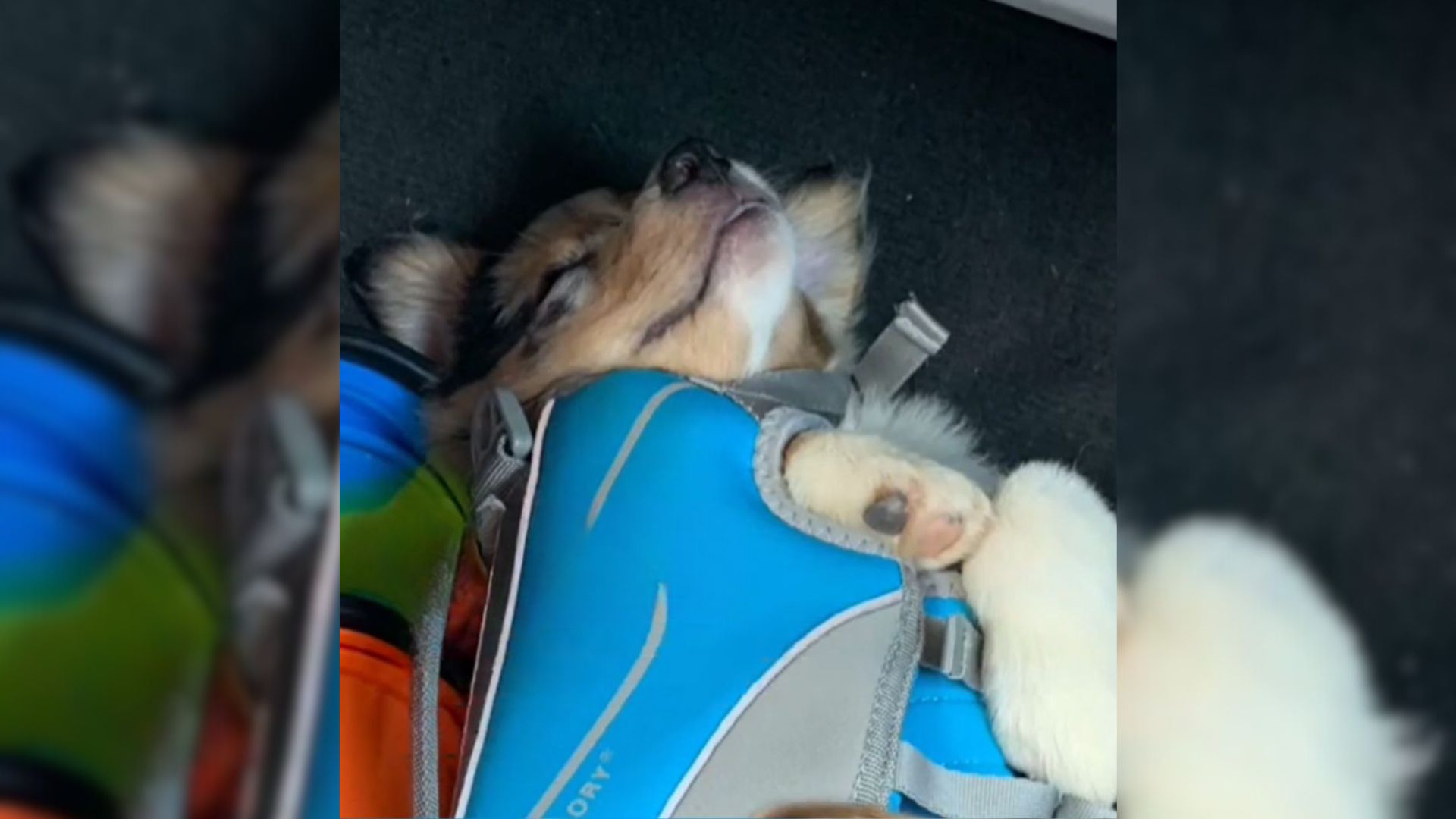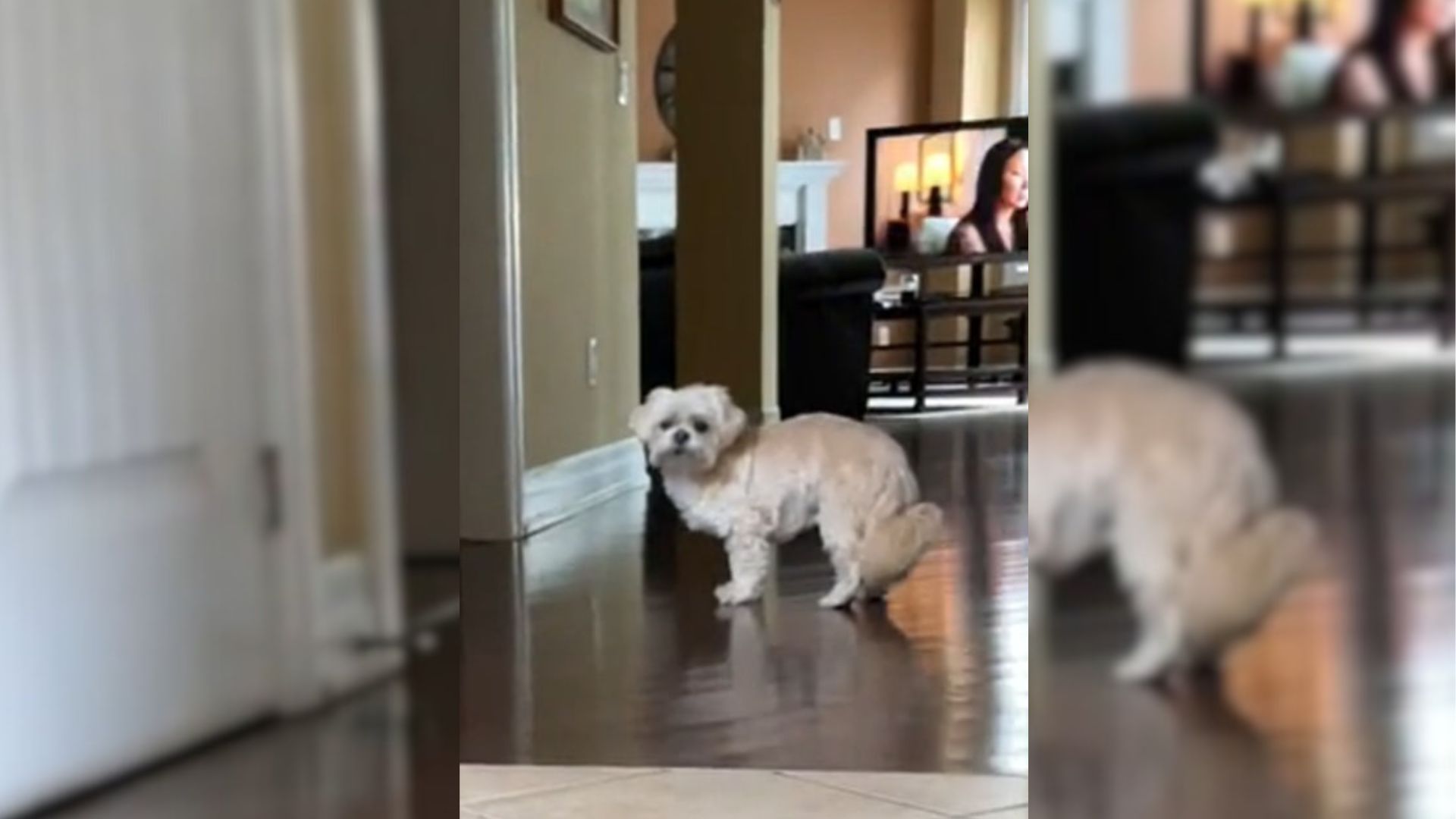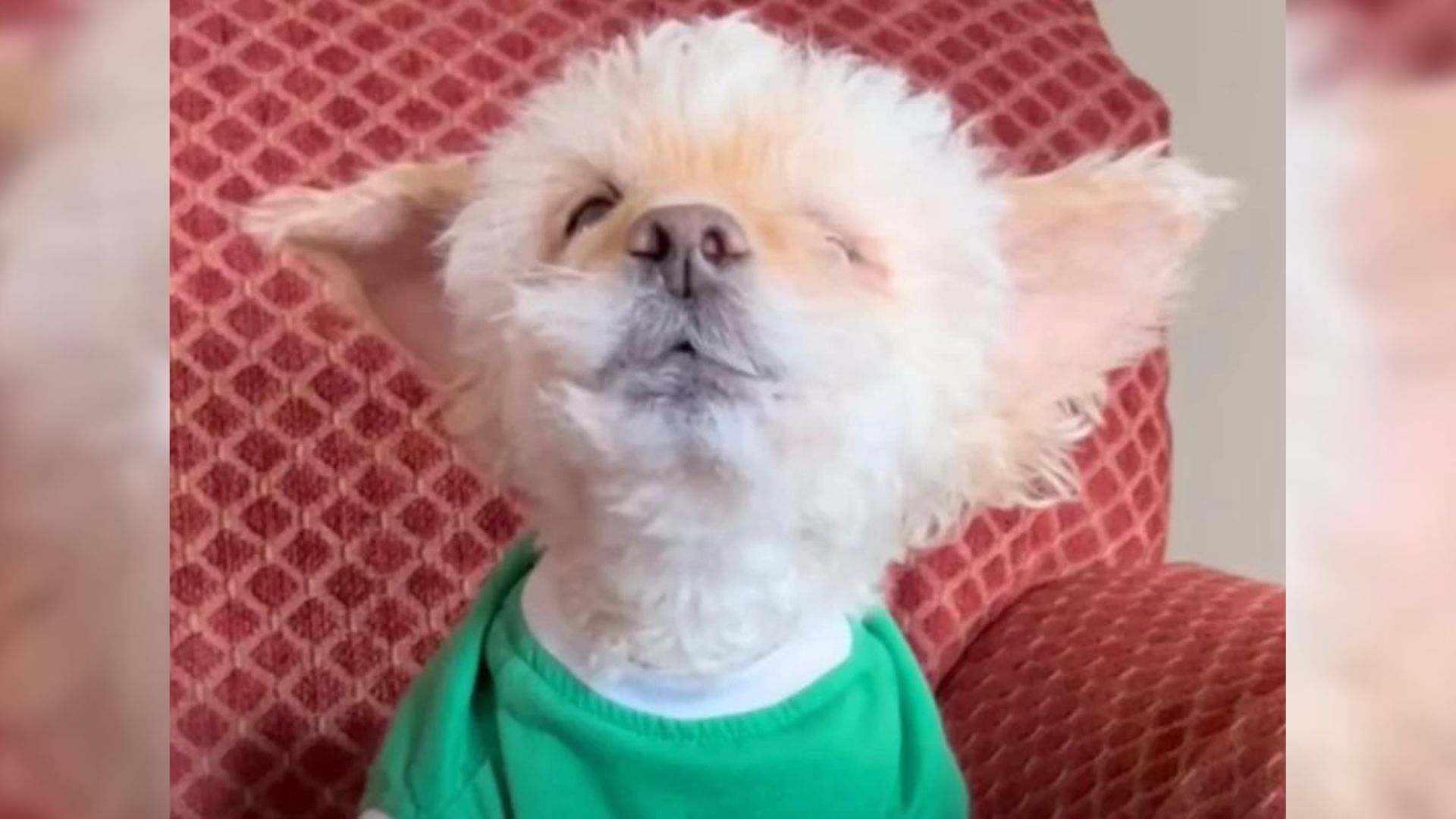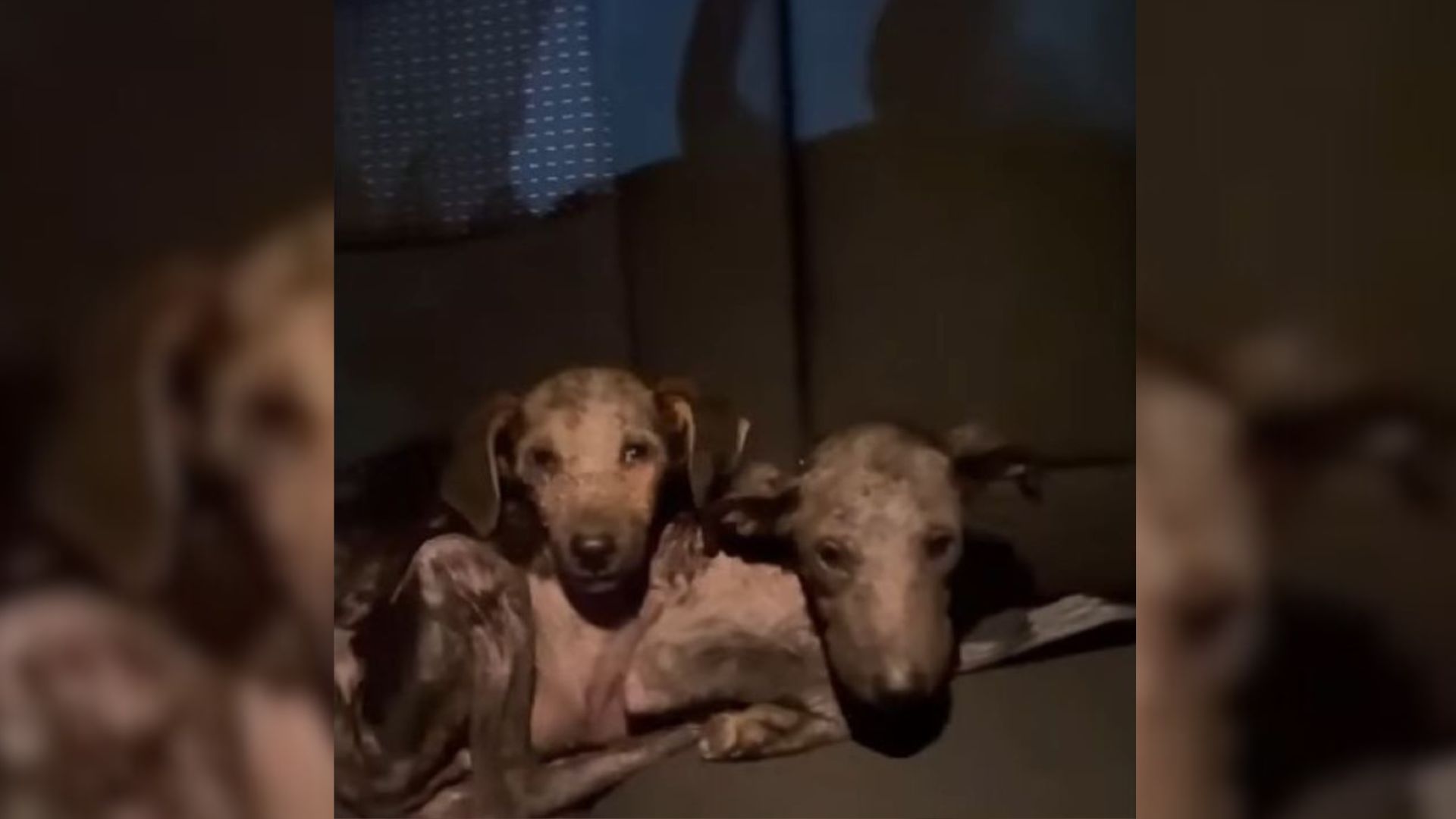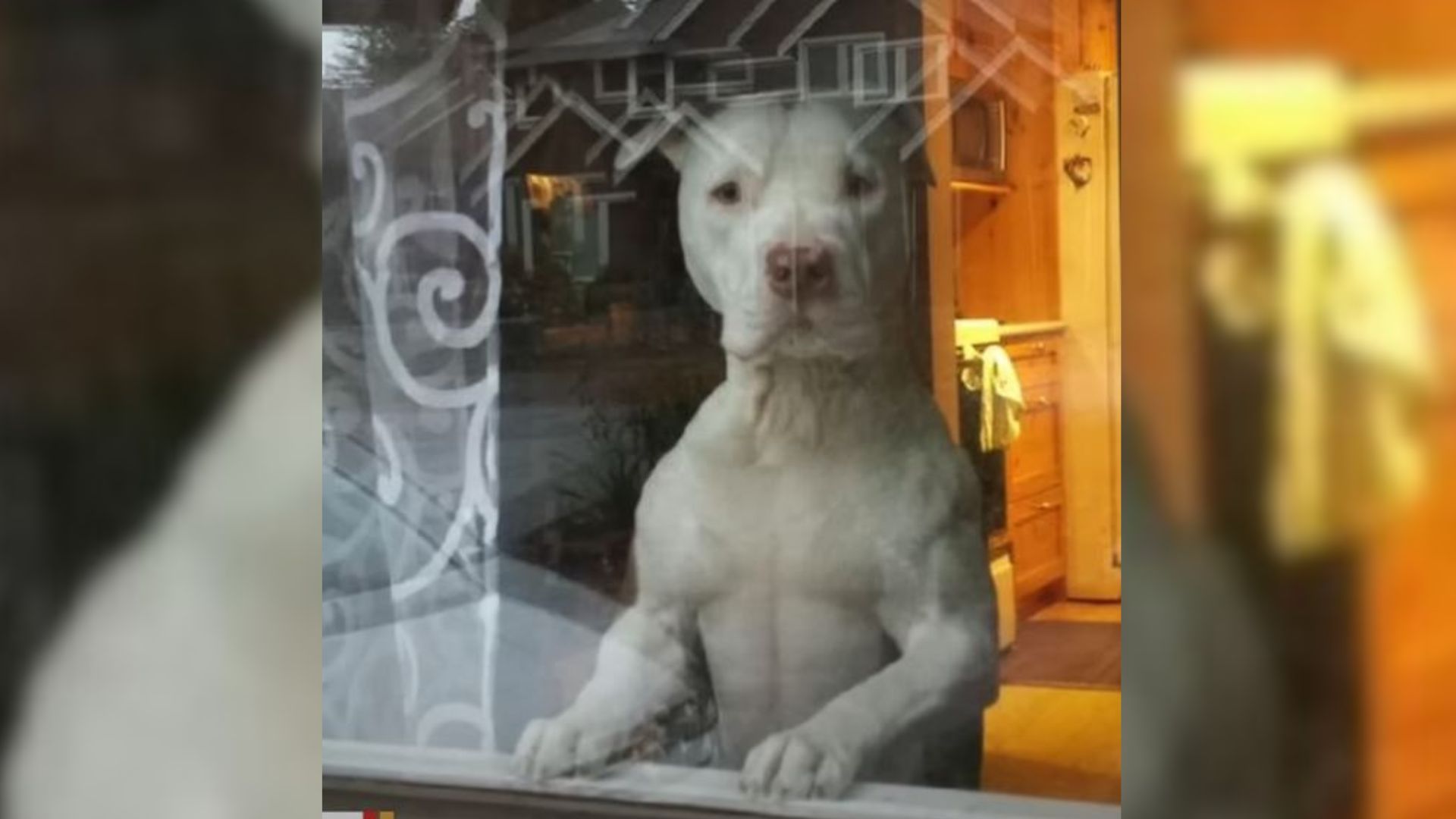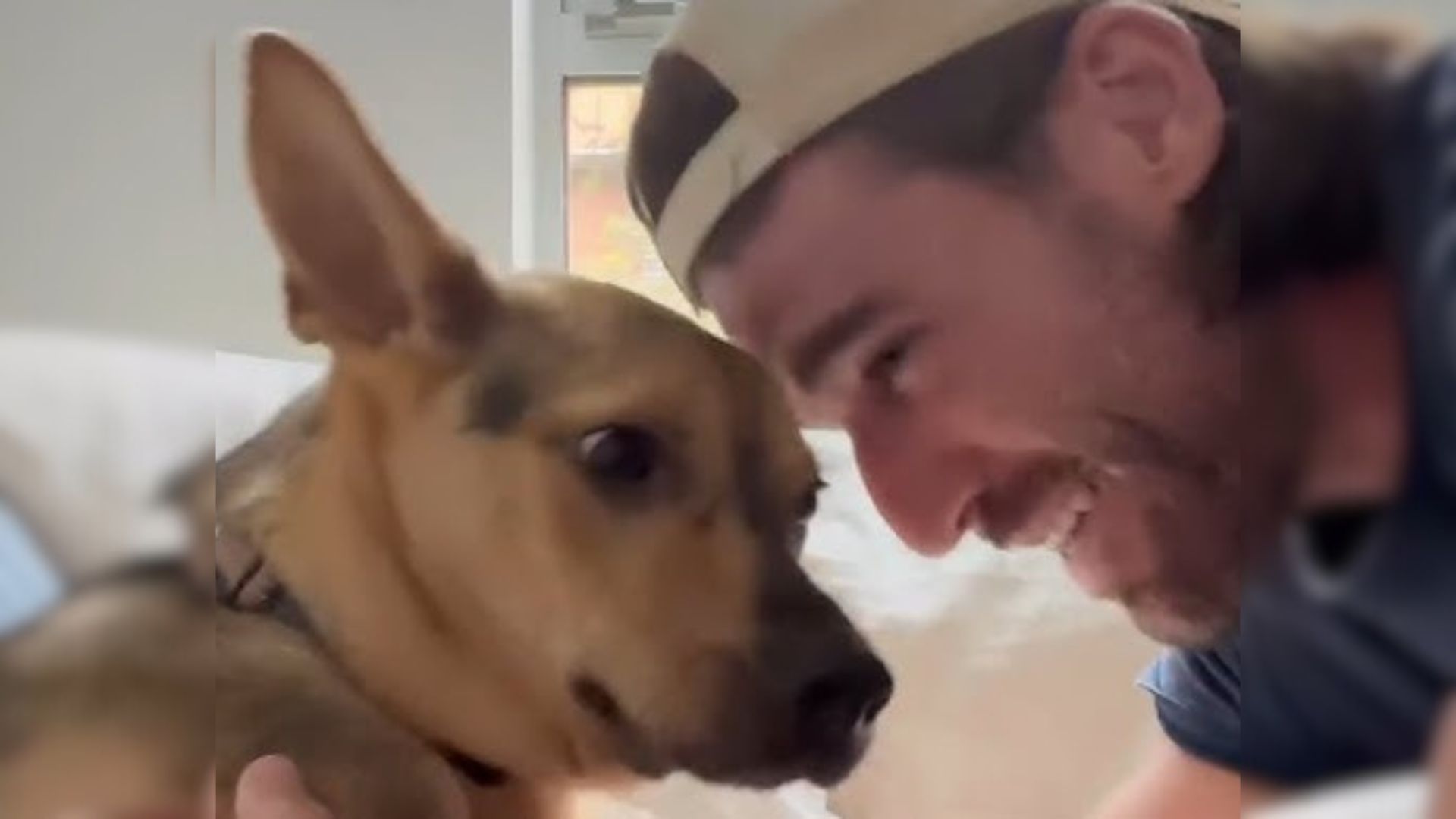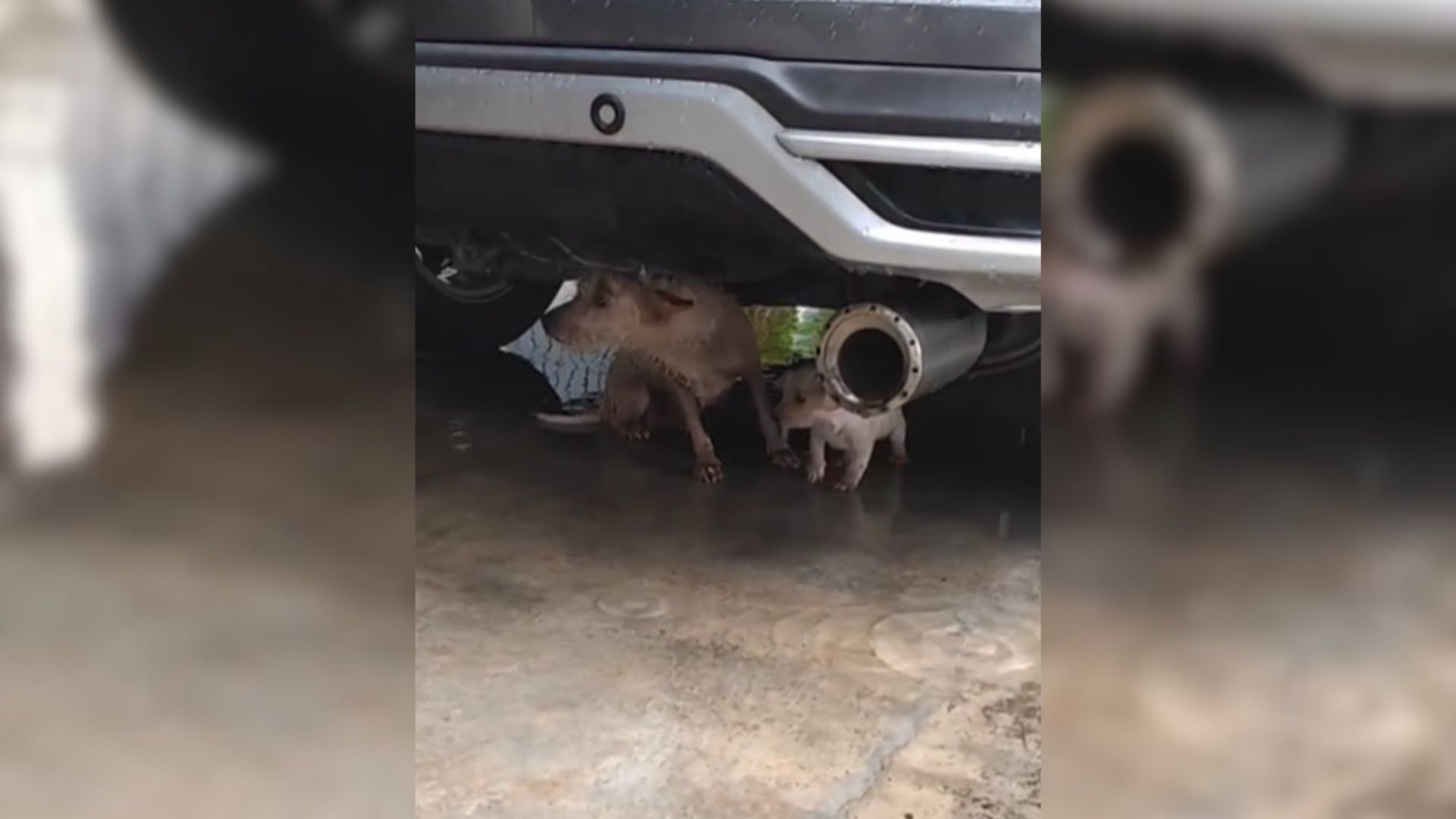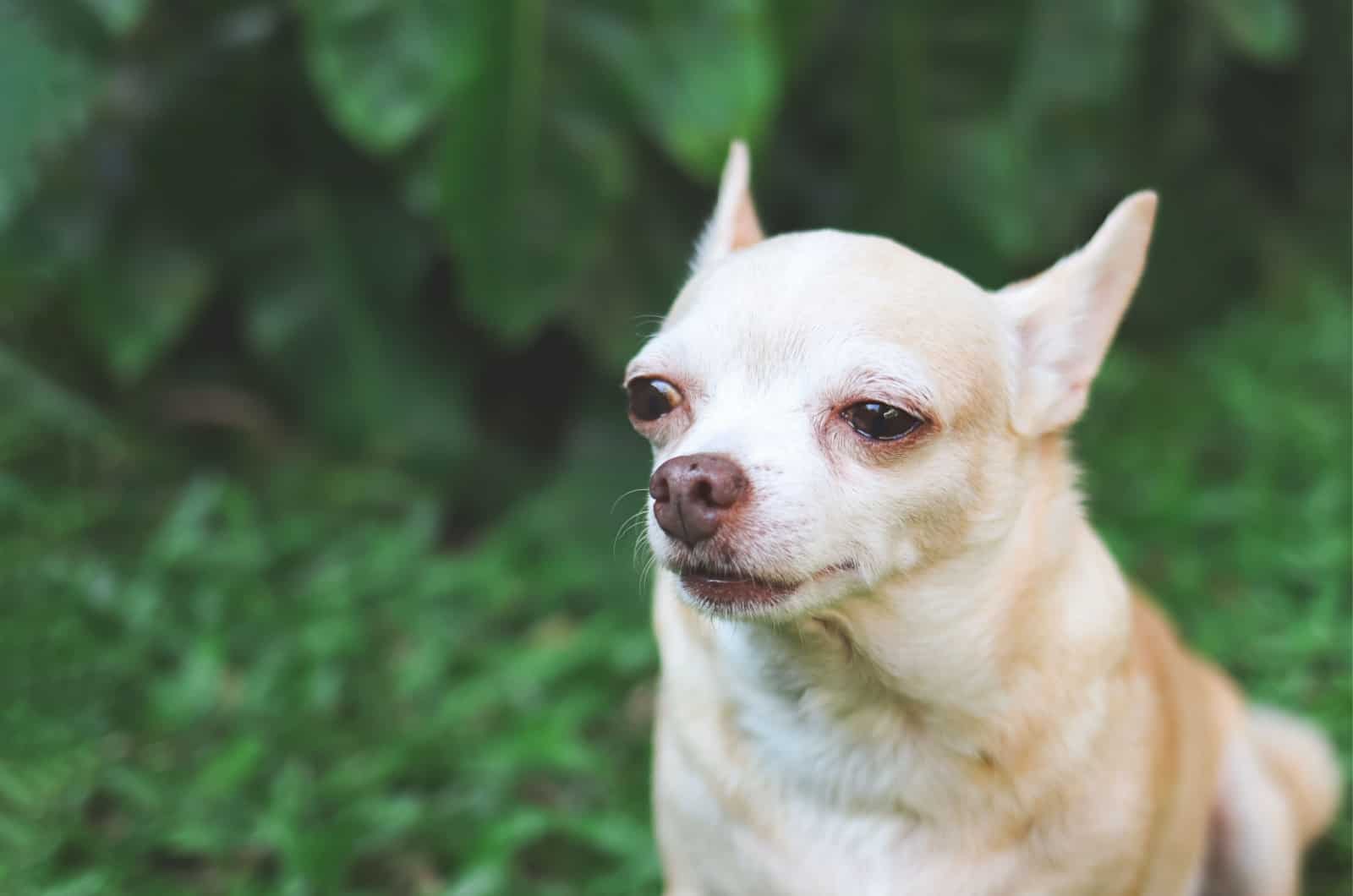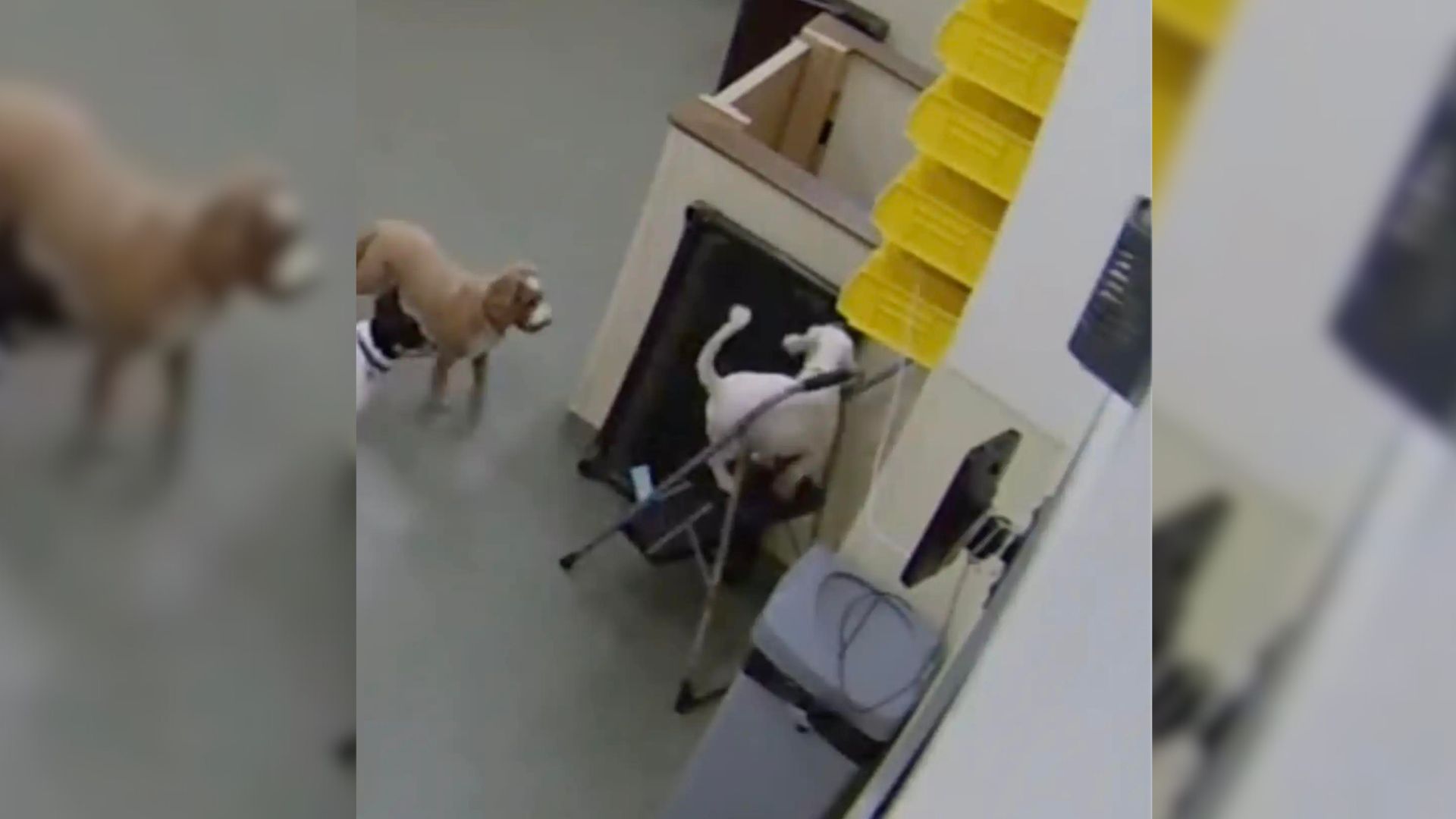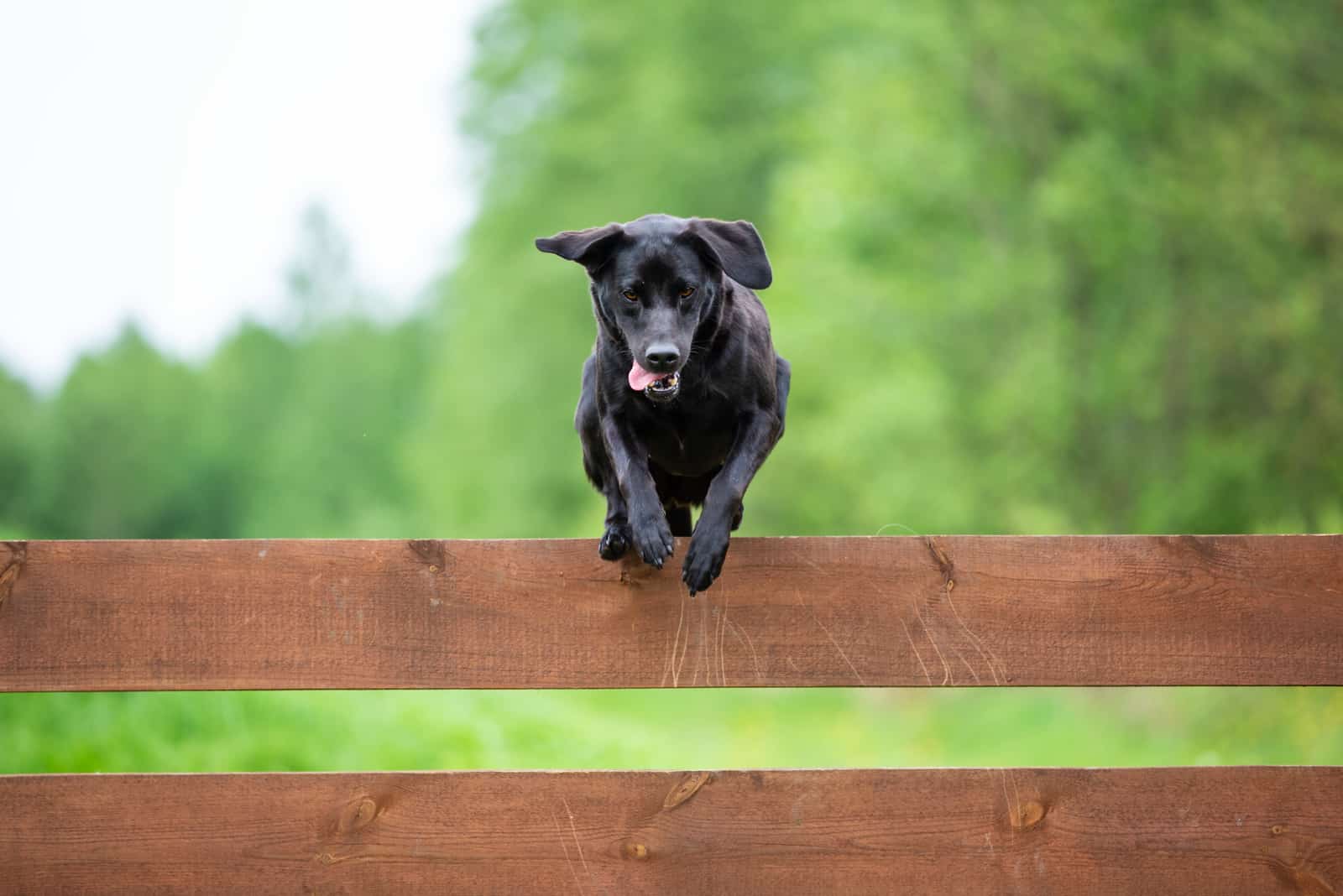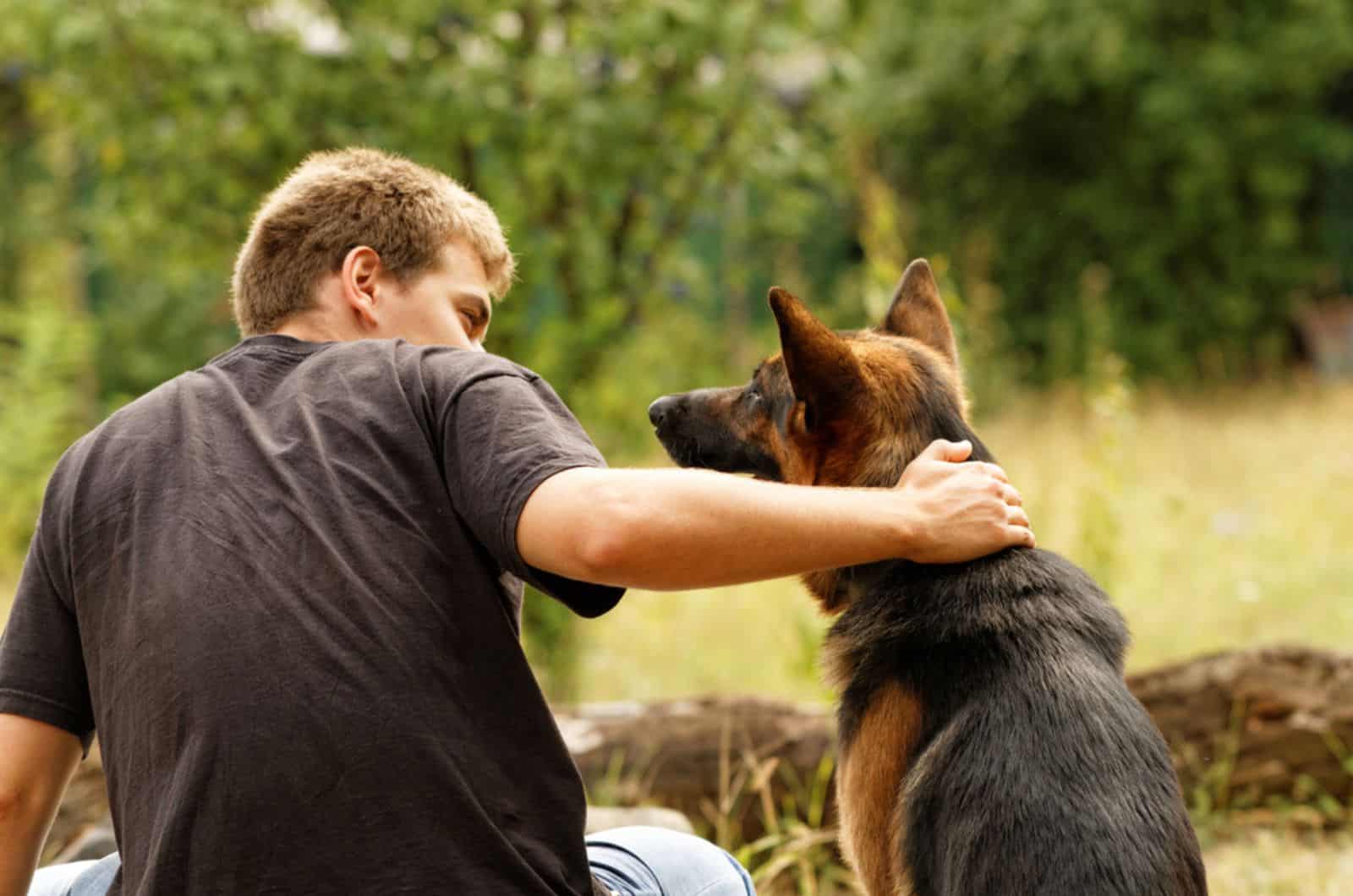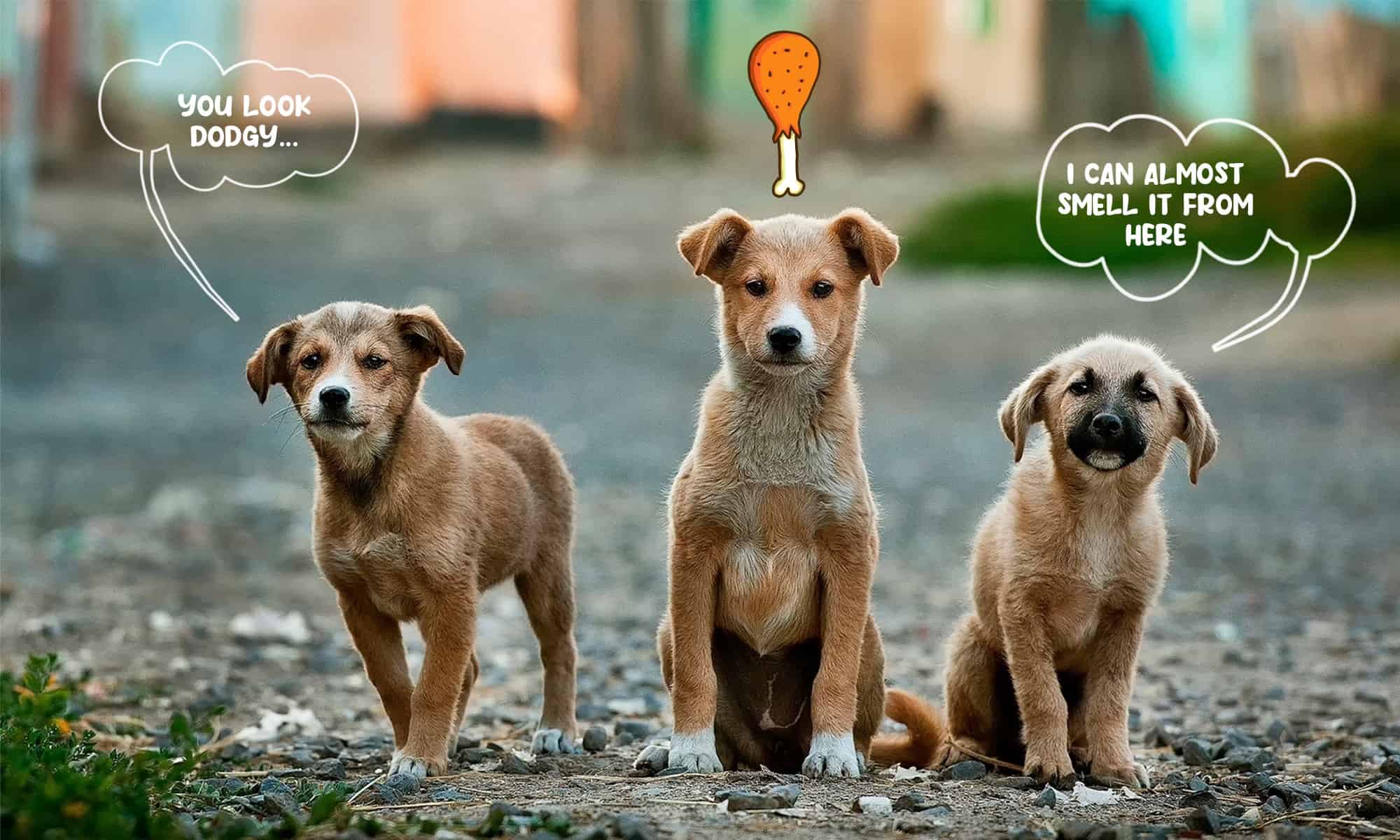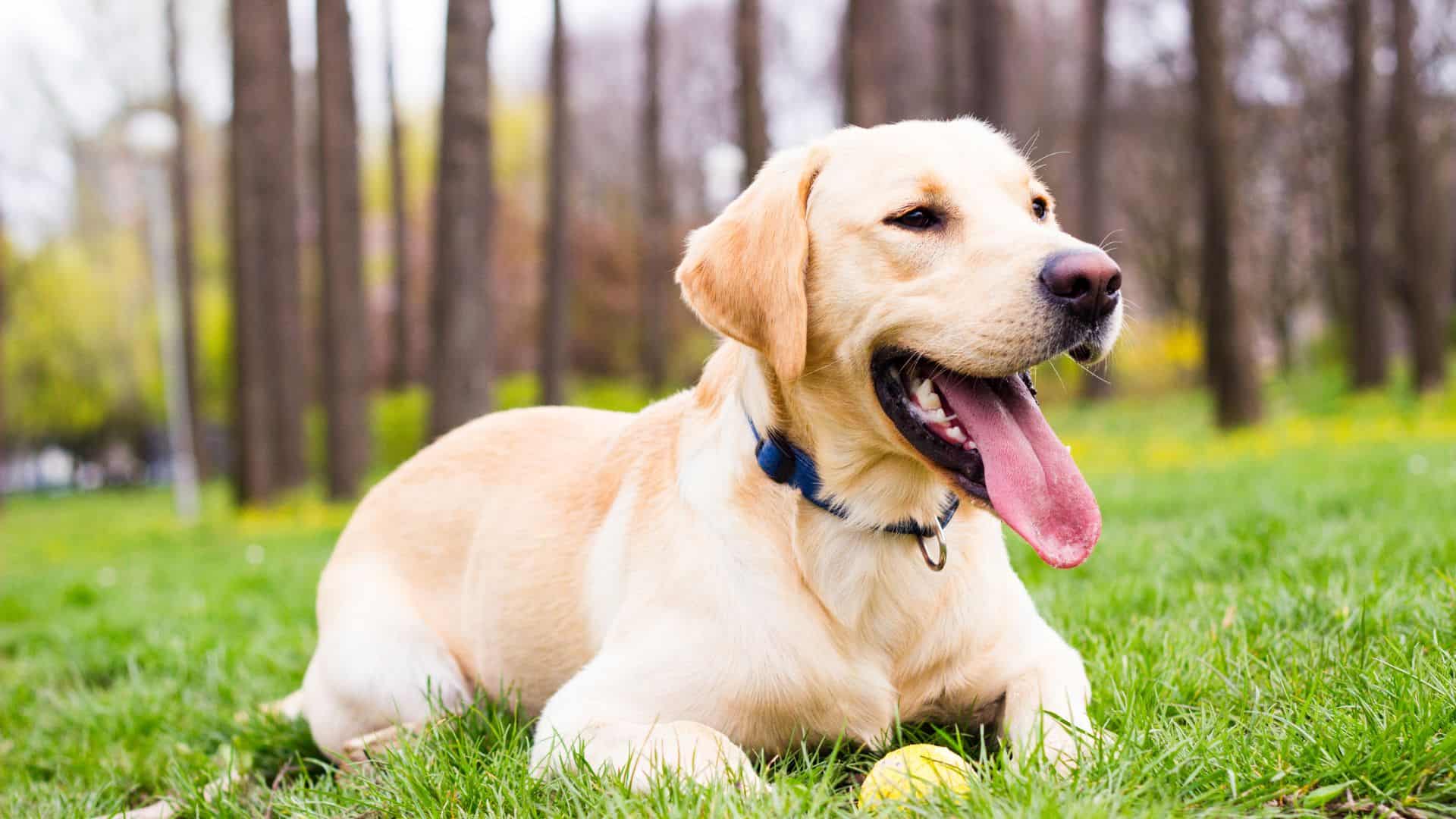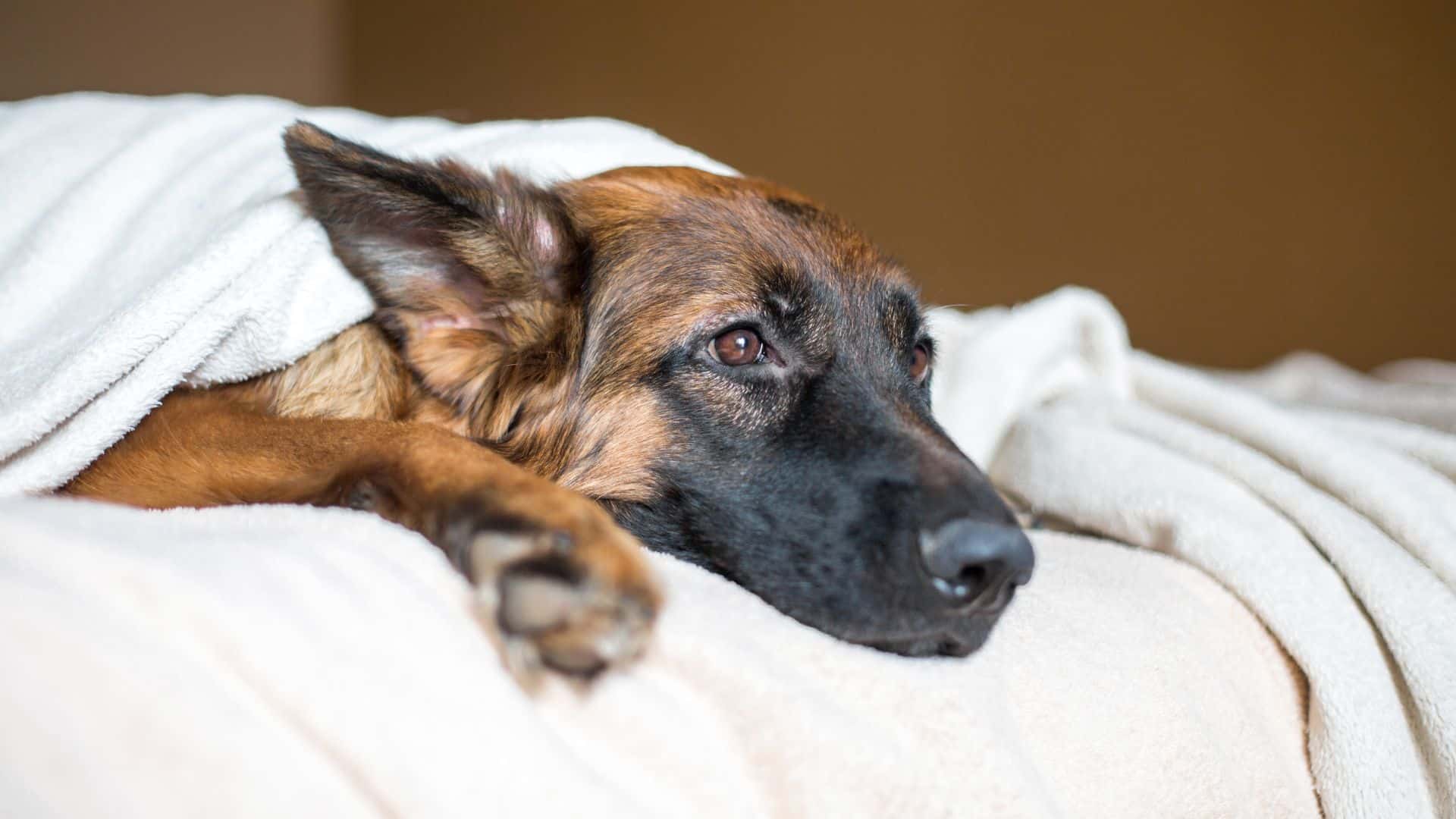As a dog owner, few things are as unpleasant and unwelcome as finding a surprise package that your dog has left for you. You might have arrived home after a tough day at work, or maybe you just got up and are headed zombie-like to the kitchen in search of your morning coffee.
Sometimes it’s the smell that gets you first. If you’re lucky, you spot it in time, as the alternative doesn’t bear thinking about. Either way, it’s not the best welcome home or the greatest start to your day as you grit your teeth, hold your breath and clean up the mess.
Aside from being gross, dog feces is potentially harmful. One gram can contain up to 23 million fecal coliform bacteria that can cause kidney disorder, dehydration, diarrhea, and cramps in humans.
So, why is your dog pooping in the house? We’re going to look at the common causes for this behavior and offer some solutions.
Why Does My Potty Trained Dog Keep Pooping In The House?
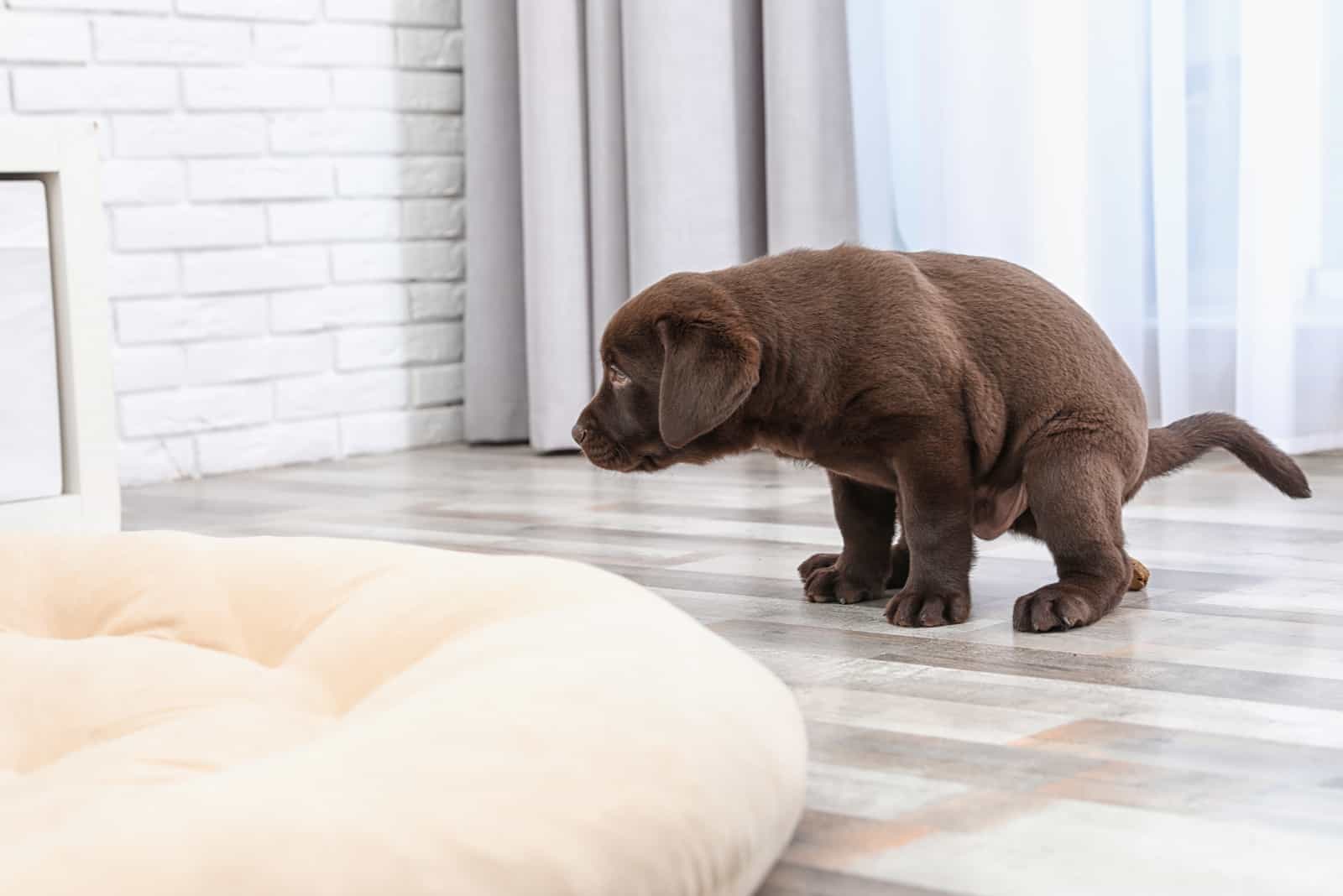
It’s very frustrating when a house-trained dog starts to poop in the house. After all, you spent a lot of time potty training them! Although some sources claim that you can potty train a dog in five days (you can’t, unless you spend literally every minute with your pup during those five days!), it usually takes at least two weeks. Generally, it takes between 4 to 6 months to fully train them, and it can take as long as one year in some cases, depending on the breed. It takes as long as it takes, and you’re not doing anything wrong!
After all this, you might wonder, why is my potty-trained dog walking and pooping inside my house?
For all your hard work, several things might cause your dog to forget its training:
• Health issues – many different health problems can cause incontinence or confusion, leading to accidents.
• Old age – older dogs are prone to a range of medical problems as their cognitive functions begin to slow down and fail, so this is essentially connected to the category above.
• Fear – loud noises are a common culprit here, things like fireworks or thunder. The effects of fear are often overlooked or underestimated, especially by people who don’t own dogs.
• A new home – dogs generally love routine and familiar surroundings. A sudden change can unsettle them. Some breeds adapt more easily, but others will need help and support to cope.
• Separation anxiety – being left alone for long periods of time can cause real problems.
We’ll go into each of these subjects in more detail as we make our way through.
Why Is My Dog Suddenly Pooping In The House At Night?
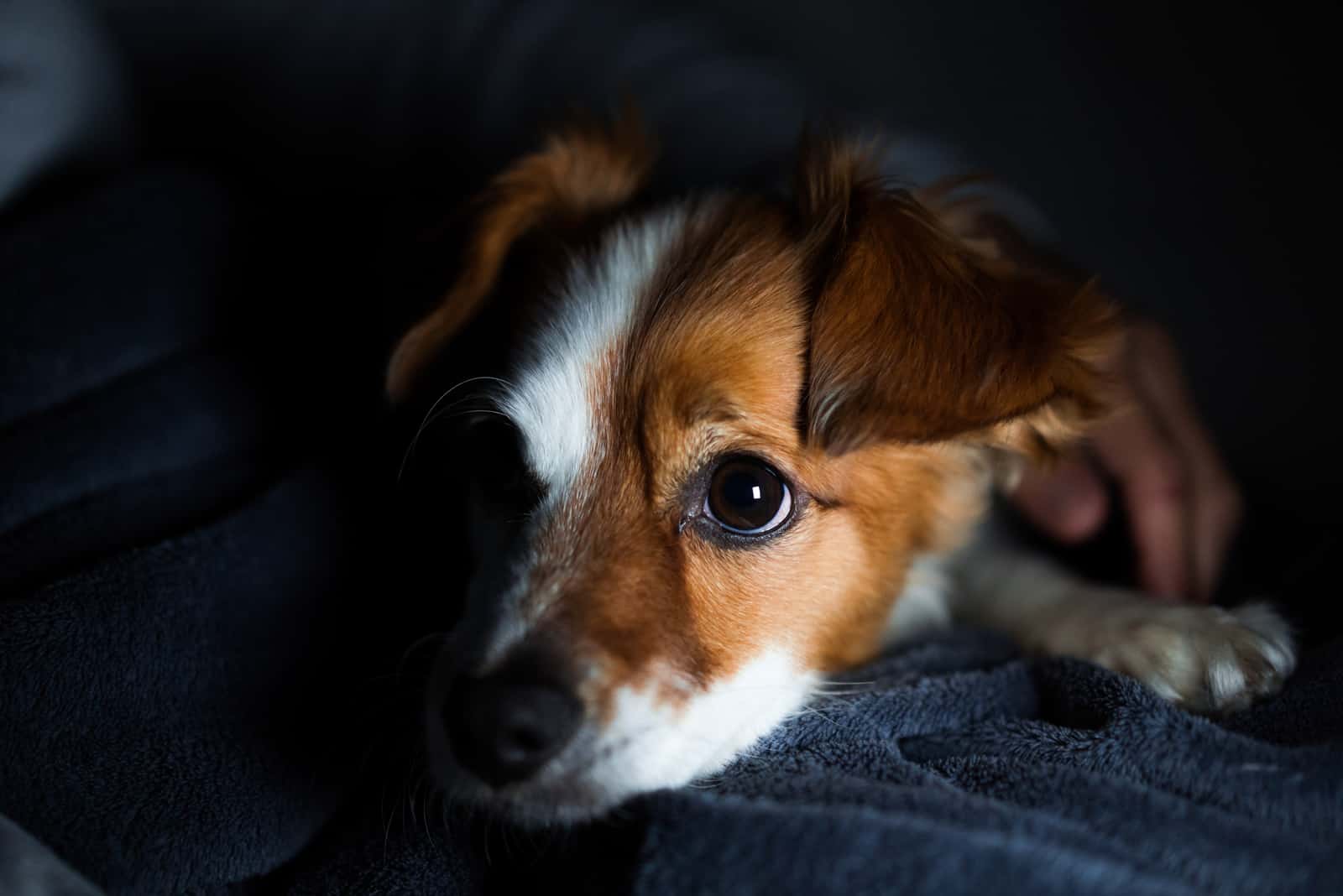
If all has been well up until now, then you should take it as a sign that something is wrong.
First, you need to consider your dog’s age. If you have a senior dog, do read on, but pay special attention to the next section (old dog pooping in the house).
Is your dog a puppy? Then it might just be an accident. They do happen from time to time! The main thing is not to show anger as this will not serve you well. Show your pup that taking potty breaks in the living room is wrong by rewarding him when he goes outside rather than punishing him for his mistake.
If he continues to go to the bathroom inside, then there is probably another reason for this behavior. You then need to look at other possibilities, as you would with a full-grown dog.
An adult dog of between one and six years should be relatively healthy, house-trained, and happy. If it suddenly starts the habit of defecating in the home, then it’s clear that something isn’t right.
Ask yourself these questions:
• When does this behavior mostly occur?
• Is the dog left alone for long periods of time?
• Have you changed their dog food recently?
• Have there been any major changes or emotional traumas in the home?
• Is your dog showing any other symptoms or signs of sickness or disease?
The first two questions on the list are important and are possibly linked. One reason for a dog pooping in the house is that they are missing you, either during the night or when you’re out in the day. You can find more on this below, in the section called Why Does My Dog Poop In The House When Left Alone?
As for the third question, any new food should ideally be introduced gradually. The canine digestive system is surprisingly delicate and reacts strongly to certain foods. Many dogs have allergies and food intolerance (all dogs are lactose intolerant to varying degrees!) that can cause unexpected bowel movements.
By introducing different foods slowly, you can watch for any unwanted effects and stop using that particular food before it gets too bad.
Dogs can be extremely sensitive to changes in the routine and atmosphere in the home. The death or departure of a family member will affect your mood. It could be that a child has left for college, or a break-up has caused a family split. Maybe someone in the household is seriously sick or has been badly injured. Whatever it is, it will affect you and your demeanor to some extent.
Your dog will notice this change and pick up on your vibes. It won’t always result in your dog pooping in the house, but it is one example of how dog behavior can be affected.
They can also be upset by other changes, such as a new dog or the arrival of a baby.
Finally, you need to check for any symptoms of sickness. Dogs have notoriously delicate tummies, and diarrhea is one of the first signs that something is wrong.
The trouble is, several different medical conditions can cause our doggy friends to forget their potty training, and some share similar symptoms, making it difficult to form a diagnosis.
These include:
• Parasites
• Muscular atrophy
• Bowel cancer
• Viral infections
• Canine cognitive dysfunction (see the next section!)
• Inflammatory bowel disease
• Food intolerances/allergies
• Arthritis
Your vet will check your furry friend over and run some tests, then prescribe a course of treatment to help them.
Old Dog Pooping In The House
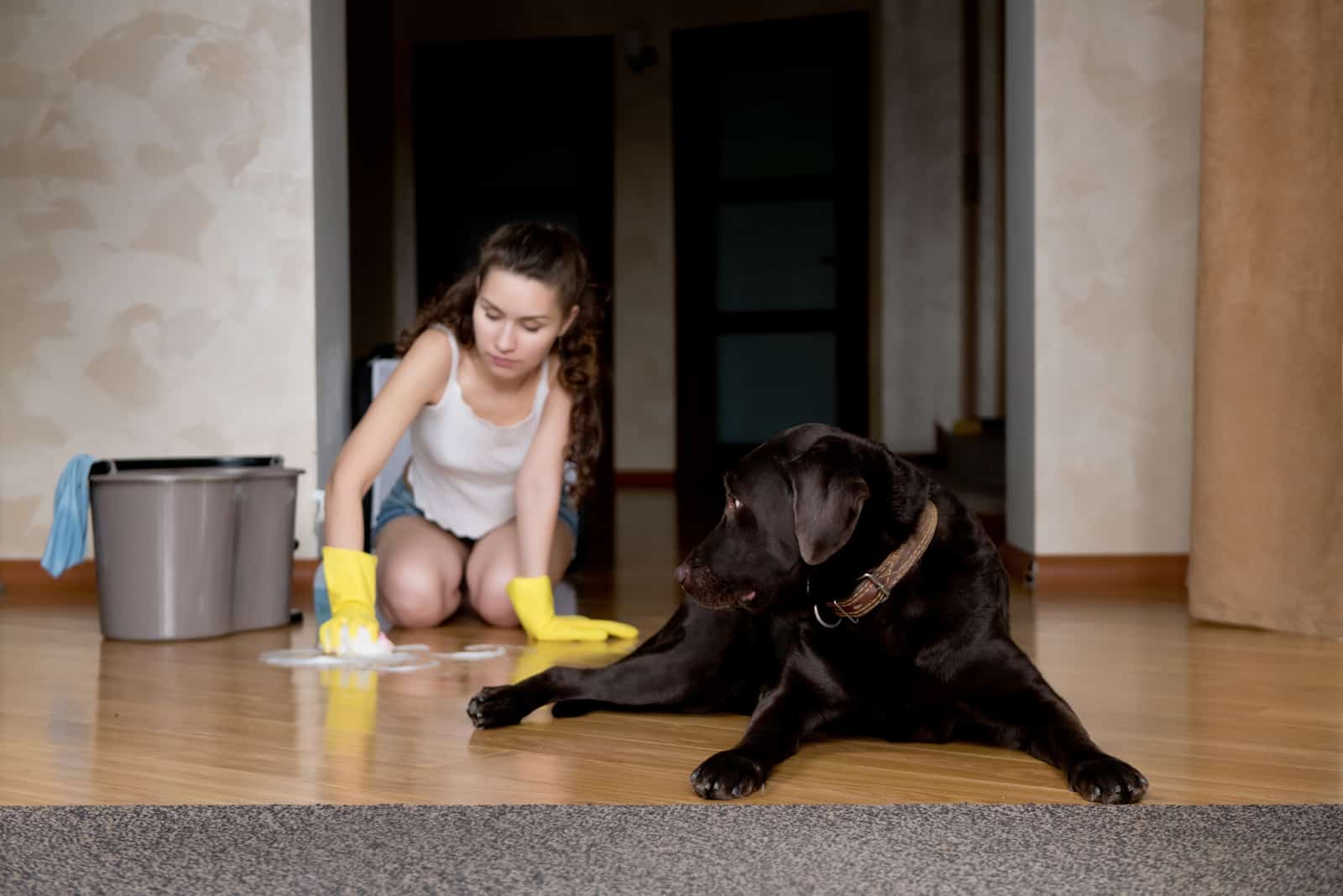
Old dogs sometimes suffer from a condition called canine cognitive dysfunction, which is similar to Alzheimer’s disease in humans. This affects the oxygen levels in their brains, causing them to lose brain function.
These poor old pooches forget to poo when they are out for a walk or forget their potty training when they are at home.
Older dogs also lose the ability to hold it in as their muscles are weaker. This is worsened by a condition called degenerative myelopathy that often weakens the hindquarters, causing incontinence.
The pain of arthritis sometimes stops dogs from wanting to poop, so they avoid going when out for a walk. When they can’t hold it any longer, they have to go, and that’s usually on the floor of your home!
Of course, older dogs are also affected by some of the other things we’ve mentioned, such as loud noises, separation anxiety, and changes in routine.
My Dog Keeps Pooping In The House In The Same Spot
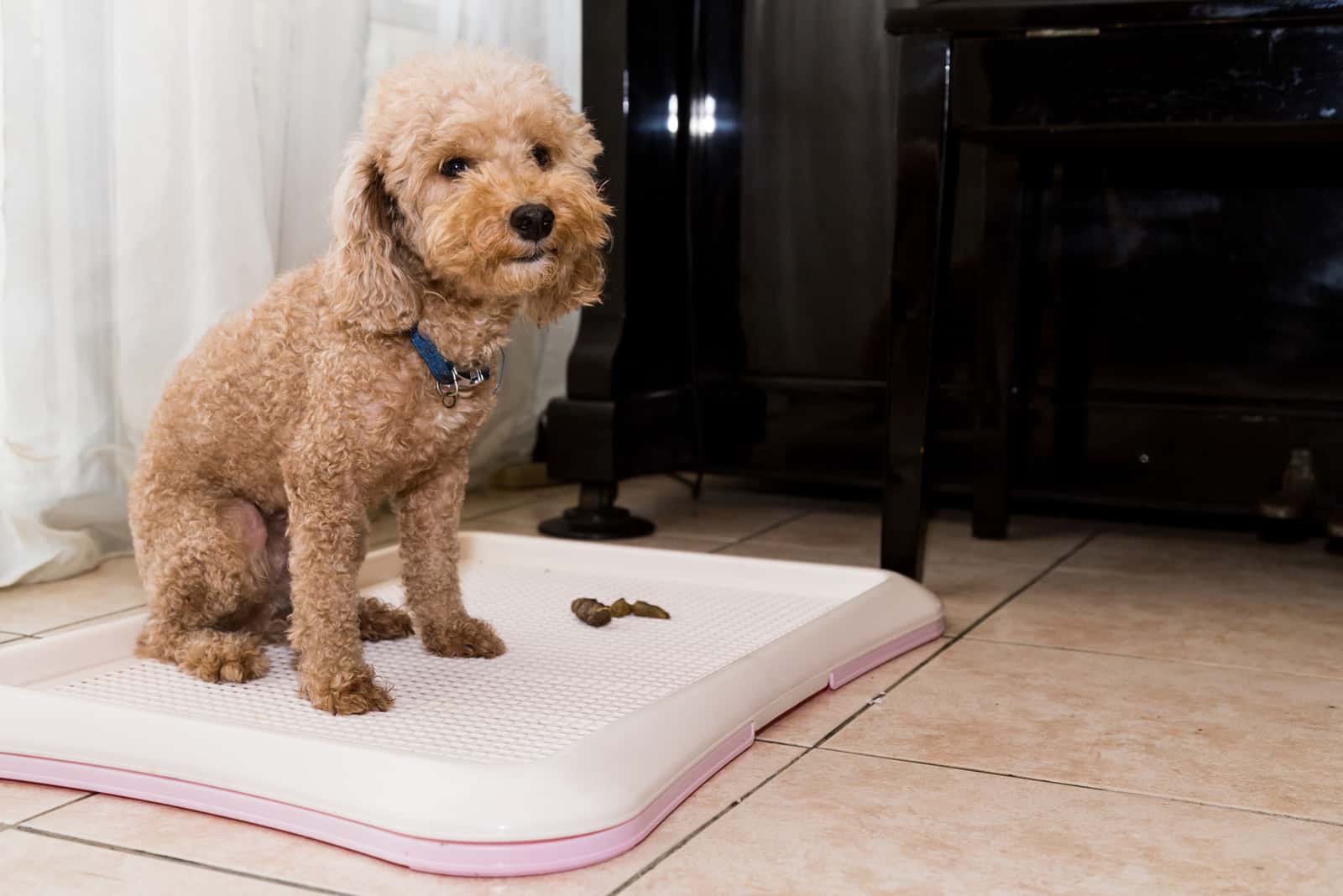
Whatever the cause of house soiling, you might notice that your dog pees or poops in the same place every time. This is because dog feces contains strong scent markers that are a way of communicating with other dogs. It’s natural for dogs to go in the same place as they are generally clean creatures. Mother dogs teach their pups to be clean and will eventually make them poop and pee away from their bed and eating place.
If you have a regular route on your daily dog walks, you might have noticed that your pooch goes in the same place (or very close by). That’s because it recognizes its own scent that has marked this area.
After an ‘accident’ at home, you’ll clean up and scrub the area thoroughly. And then your furry friend makes a deposit in exactly the same spot!
These scent markers are annoyingly stubborn. The best solution is to invest in an enzymatic cleaner that will break down the chemicals and remove the scent from the surface.
In the meantime, you need to find out why your dog is behaving this way and find a solution.
Why Does My Dog Poop In The House When Left Alone?
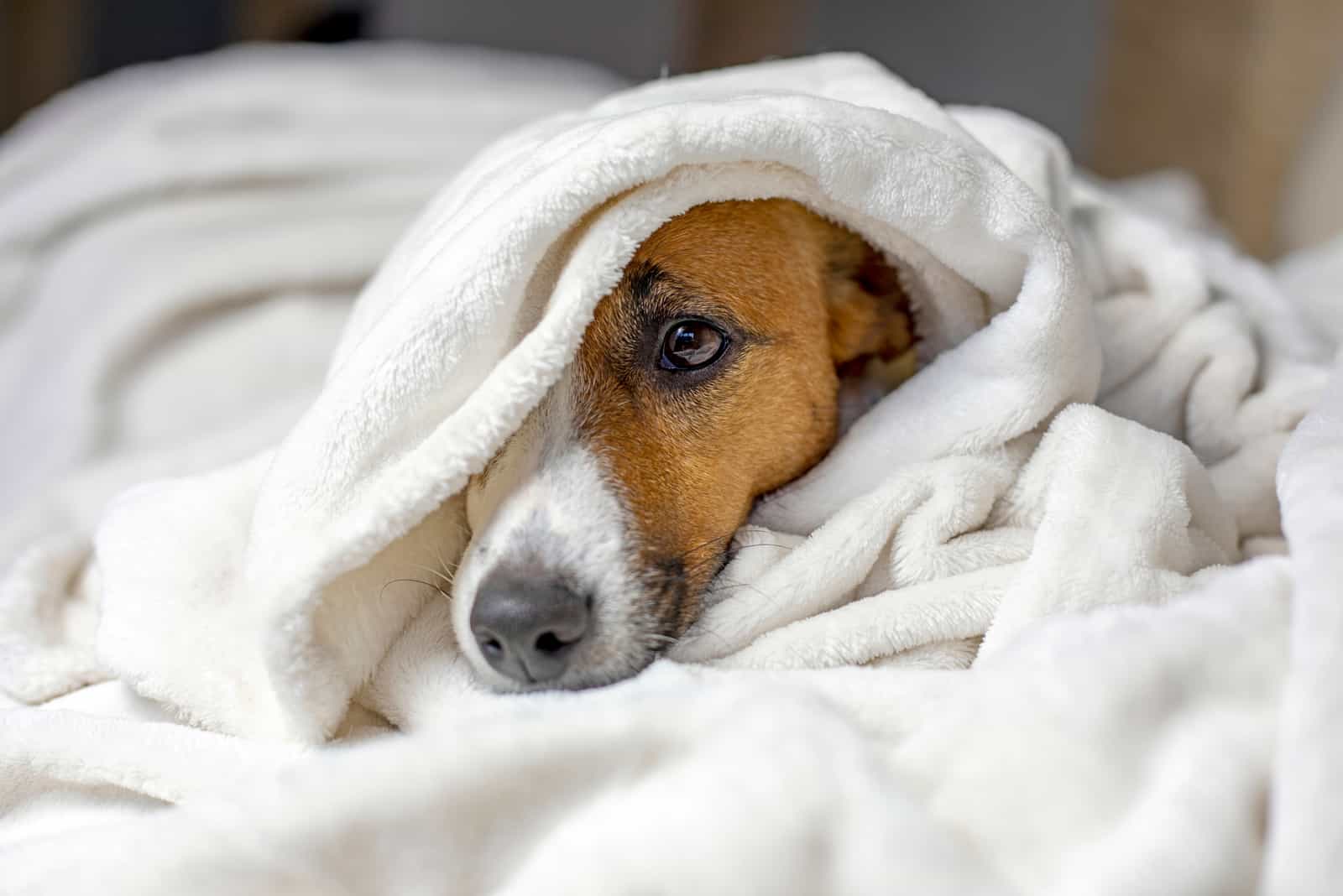
One of the major causes of this behavior is separation anxiety. Many dog owners don’t realize the impact that their absence has on their pooch.
You might have had this conversation before:
“Hi neighbor, your dog was really howling while you were out!”
“Are you sure? My dog doesn’t howl!”
This is a conversation that has been played out a million times over, and the dog owner never accepts that their furry friend makes a fuss when they’re away from home because they don’t hear it!
The realization only dawns on them when other behavioral issues become apparent. As well as barking and howling excessively, their dog will start chewing up the home and peeing and pooping indoors.
When this happens, there’s a tendency to believe that the dog is hitting out at you for leaving them home alone. It’s natural for humans to think this way, as we often act vindictively towards others who have upset us. Dogs aren’t built like this. Your furry friend believes that it has been abandoned. Separation anxiety is just that: your dog is so anxious that you won’t return that it has a kind of panic attack.
This causes a flood of feelings, like fear, confusion, and aggression. Dogs don’t have a great concept of time. To them, you’re either there, or you’re not. How many of us have been met with an enthusiastic greeting when we’ve been gone only ten minutes?
The best way forward is through training and behavior modification. For extreme cases, you might need the help of an animal behaviorist or dog trainer.
You also need to try to get your dog used to your absence. If possible, use a pet sitter or doggy daycare to break up the day. Get friends or family to check in on your pooch every so often so they don’t get lonely.
When you leave home, what’s the last thing you do? That’s right, you make a big deal about saying goodbye to your dog! And when you return, you’re smothered in doggy kisses as you tell them just how good they are and how much you love them (until you spot the destruction and the poop).
It’s going to be difficult, but try not to fuss as you leave. Make it as normal a process as possible. Likewise, when you return, try to ignore your dog until they have calmed down. Wait for five or ten minutes, then give them all the love.
After a while, your best friend will start to accept that sometimes you’re not going to be there.
Should You Punish Your Dog For Pooping In The House?
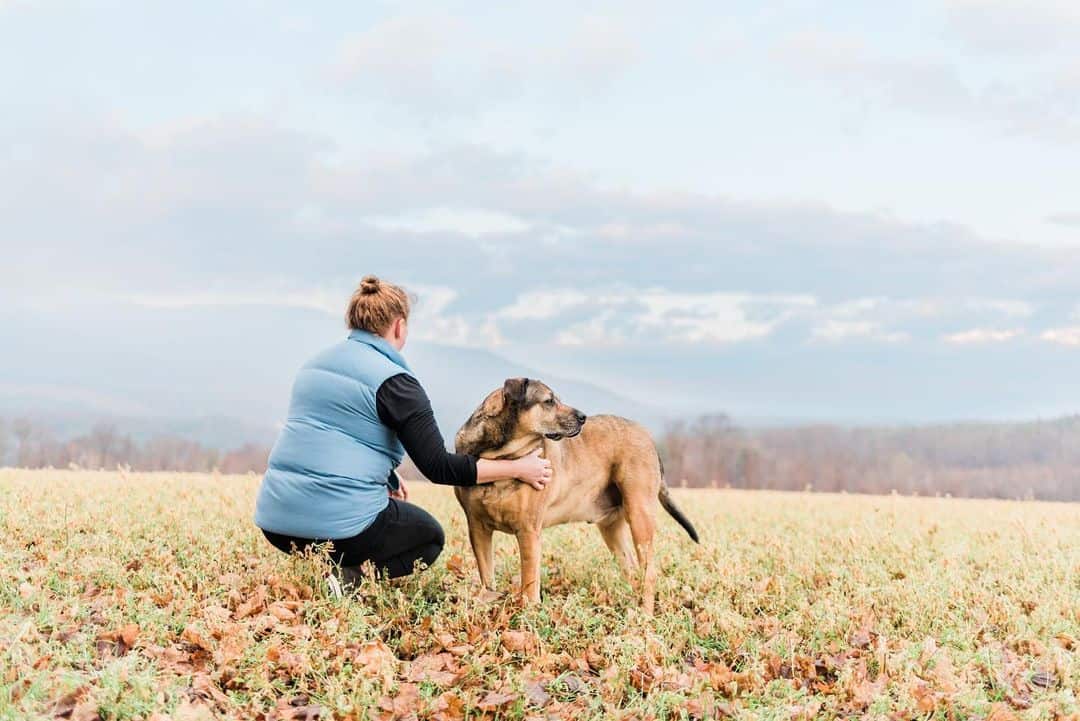
Photo from: @ashleyasker
No, you should never punish a dog for this.
Attitudes towards dog training have changed dramatically for the better in recent times. Positive reinforcement and reward-based training achieve far better results and don’t involve cruelty.
There are still old-school trainers and canine behavior ‘experts’ who advocate physical punishment, choke chains, and harsh words to control dogs. Thankfully, these are gradually being replaced by people with compassion and understanding.
You might still come across those who tell you to rub your dog’s nose in the mess that they have made. This is not only cruel, but it will backfire. The only thing you will teach your dog is to fear you. The problem will likely continue, but they will try to hide it.
Whatever the root cause is, punishing your dog won’t solve the issue and will probably add to the problem.
It’s natural to be frustrated and angry at being confronted by a mess on your floor, but directing this at your dog will only harm them. You need to look for solutions and reward your dog when they do the right thing.
It’s the best way forward for everyone.
How Do You Stop Your Dog From Pooping In The House?
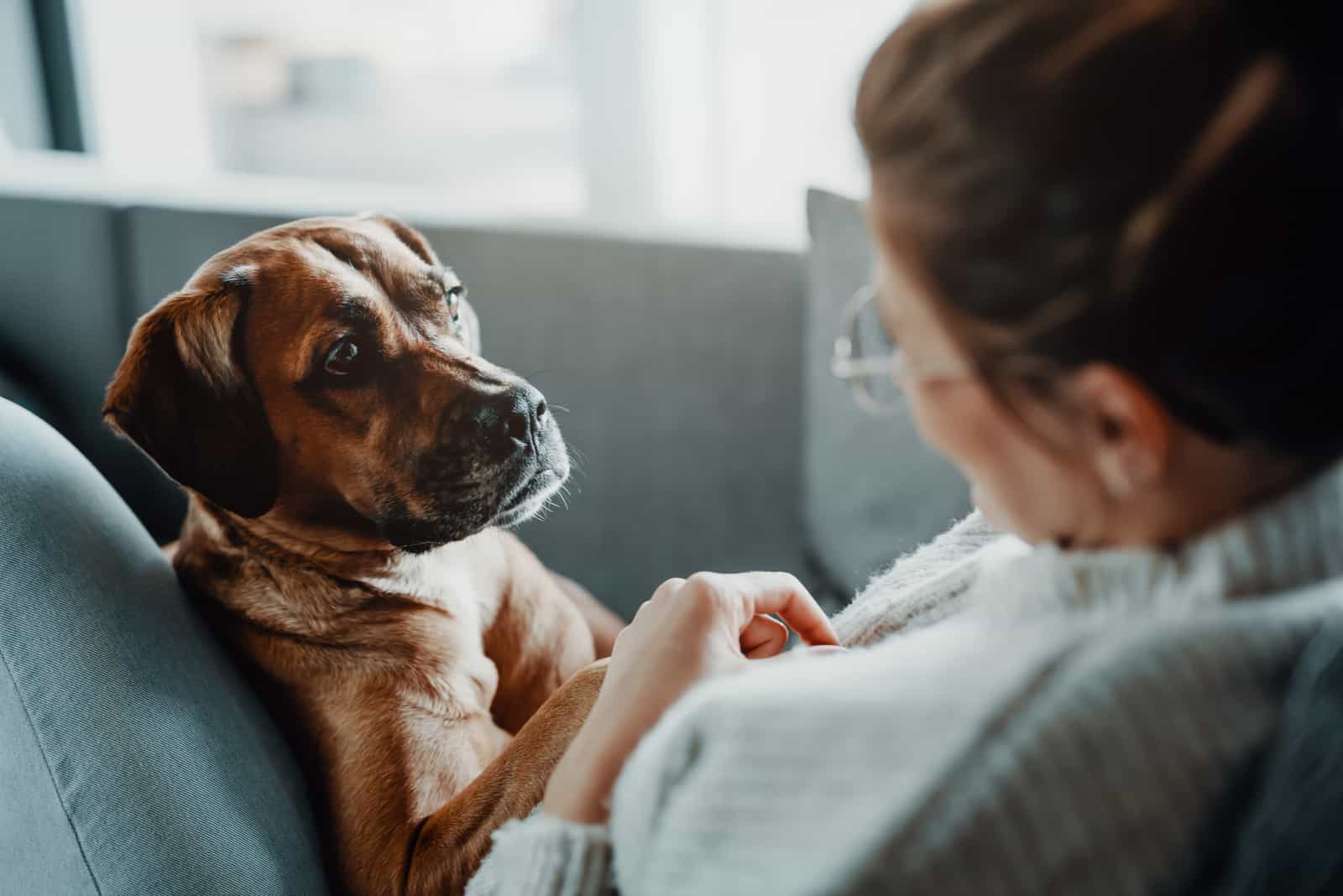
It depends on the cause!
Puppies can be house-trained. It can take a while, and you need to be patient. You also need to learn when your dog needs to go potty. They’ll whine, scratch at the door, walk around in circles, and sniff around for a good spot. And if you’re not quick enough, that spot will be your best rug.
Crate training is an excellent way of potty training, as dogs will rarely poop in their sleeping area. A dog crate also provides a safe and comfortable space where your dog will feel secure and at home, even when you use the crate to transport them places.
This makes it great for dogs that are fearful of loud noises, as well as helping them cope with separation anxiety. They’ll recognize this space as a safe haven where they are rewarded for good behavior. And it stops your home from being trashed and pooped in!
It’s a bit trickier to stop your dog pooping in the house if it’s due to medical issues. First, you need to identify what the problem is, and for this, you’ll need the help of a vet or pet health specialist. Hopefully, it will be easily treatable, and your dog will be back to normal within a short while. If it does turn out to be more serious, then your vet will guide and support you through the various options and stages.
With older dogs, even when you find the cause, you still might not be able to stop them from pooping in your house, especially if they have canine cognitive dysfunction.
Your vet will help you draw up a care plan for your poor old pooch and may recommend doggy diapers to help avoid accidents. Read our article on doggy diapers to find out more information about this method.
Finally, we haven’t mentioned the possibility that your dog is simply bored. Energetic dogs need exercise and mental stimulation. Make sure your pooch gets the right amount of each, and you’ll see a change in its behavior. As they say, a tired dog is a happy dog!
As unpleasant as this subject is, it’s a common problem for dog lovers. However, it doesn’t have to be a major one. We hope this guide helps you overcome the issue and that your floors will soon be poop-free for good!
Read Next:
• Why Do Dogs Eat Cat Poop: 6 Reasons And How To Stop It
• 6 Home Remedies For Dog Constipation That Really Help
• 8 Helpful Tips For How To Stop Dog From Eating Poop

